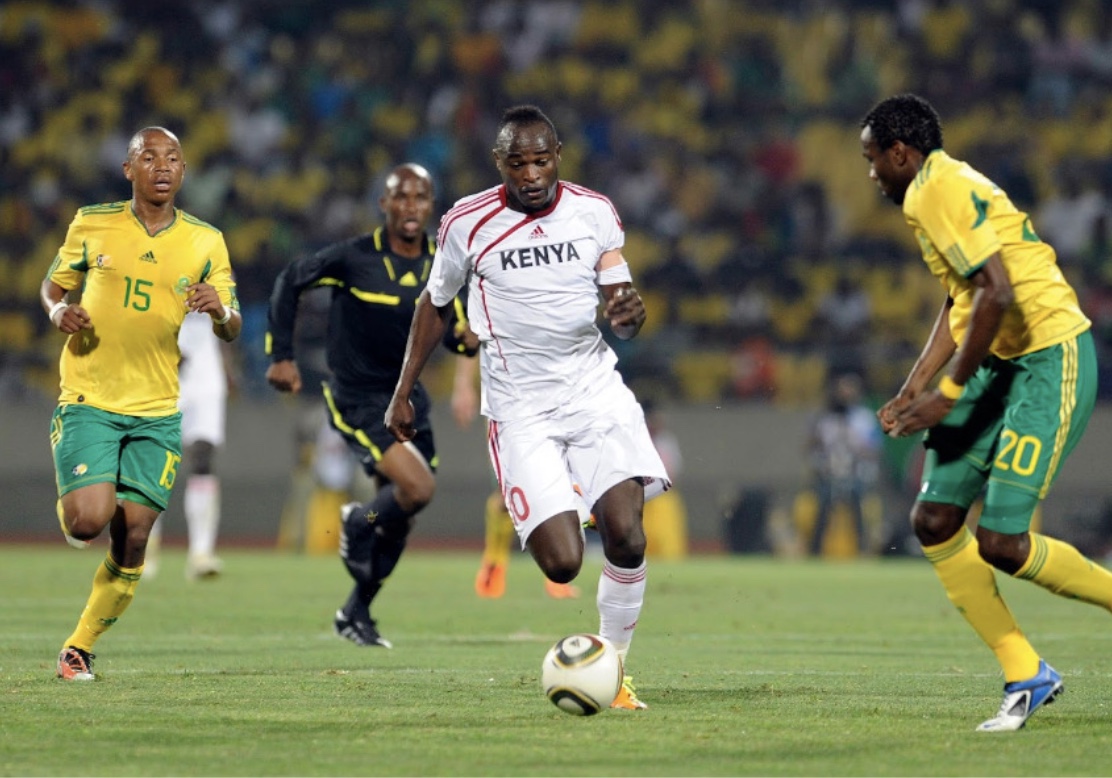Most Kenyan football commentators continue to ponder the question, why doesn’t the country’s football inspire confidence or generate sufficient value, to enable it sustain itself and create a conveyor belt of talent.
Surely, if the country could produce Champions League winner McDonald Mariga, Victor Wanyama and mercurial striker Dennis Oliech, shouldn’t the same system that produced these caliber of players be churning them out regularly?

Why won’t Kenyan sports consumers (fans) touch the local game with a 10-foot pole despite best efforts by such credible institutions as Pan African sports broadcaster SUPERSPORT, who have in the past both pumped in millions of dollars and broadcast dozens of Kenyan Premier League (KPL) matches weekly?
The answer, no one will ever accept to purchase shit, no matter how beautifully you attempt to dress or package it.
And unfortunately, that is exactly the perception that a wide majority of Kenyans have of their football, a perception which, we must add, has over the years seeped into Kenyan corporate thinking thus making it virtually impossible to ignite upbeat, random conversations regarding sponsorship.
What has been the role of FIFA in this tragi-comedy called Kenyan football?
Kenya’s football fortunes appear to have taken a terrible turn caused by the confluence of two factors, one at the World Governing body FIFA and the other, back in Kenya at the Kenyan FA (then known as KFF), beginning in 1996.
Kenya had just come through a fantastic period in continental football, having qualified for back-to-back African Cup of Nations (AFCONs) in 1988 and 1990 and having also been granted the hosting rights to the 1996 AFCON.
In those days, the AFCON was an 8-team affair, and therefore to qualify was no mean feat.
However, historians posit that this upsurge in Kenyan football also coincided with great political turmoil and upheaval in that East African country, which led to the first ever multiparty elections of 1992 and the advent of grand corruption on an industrial scale, which accompanied the politics.
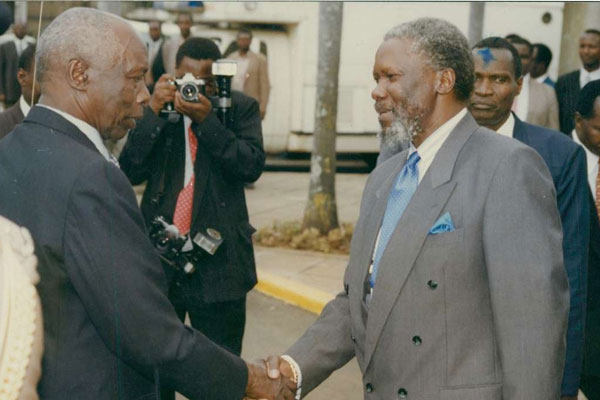
Adversaries: Former Kenyan President Daniel Moi (left) with KFF President Omino.
By 1996, the decision to host the AFCON had been crowded out by political and tribal considerations, then Kenyan strongman, President Daniel Moi was very uncomfortable with then KFF President Joab Omino, who we are informed unluckily came from a Kenyan ethnic community that was known to be solidly opposed to his (Daniel Moi’s) misrule.
These parochial considerations panel beat President Daniel Moi and his reasoning, which were both limited to the rather childish inference that a successful hosting of the AFCON would score the KFF President Omino massive political points and make him a real contender for the National presidency of the country.
At no point did President Daniel Moi consider that he himself could leverage the opportunity and come out both smelling of roses and looking heroic, just as he had done a decade earlier when Kenya hosted the 1987 All Africa Games.
So out went Kenya’s watershed football moment and with its departure, begun an era of utter football despondency and attrition, which has been compounded by successive missteps and outright stupidity since then.
The first critical error in Kenyan football took place as an off-shoot of the cancelled 1996 AFCON hosting, when the self-same President Daniel Moi decided to make changes at the KFF by influencing that year’s election, which brought to the helm, the unlikely duo of Peter Kenneth as President and Sam Nyamweya as Secretary General.

Nyamweya in particular was a dyed-in-the-wool member of the then ruling political party and more than KFF President Kenneth, had a direct line to the Kenyan President Moi and the influence that comes along with such access.
And so began the saddest and darkest chapter of Kenyan football.
A 1998 broadcast arrangement between KFF, National broadcaster (KBC) and National treasure Kenya Breweries Ltd as both title and broadcast sponsor was signed, with the sponsorship monies being deposited periodically in a sort of an escrow account.
To date, nobody can quite put their finger on exactly how Nyamweya managed to either corrupt or dupe the various signatories to this account, some say that he lied to them that the money was an advance for the National football team (Harambee Stars) which would be returned to the account at a later date.
All that is now known is that an accidental spot check of the bank account showed that no money remained and no supporting documentation for its disappearance existed. Many good people lost their jobs either for being naive to or completely unaware of the situation.
Today, many of those junior corporate employees and their friends who experienced the ruthlessness of Nyamweya and career-limiting potential of football, and who have over the years risen to their current senior corporate positions, would likely NEVER touch football, at least not in any meaningful way.
Nyamweya was by then too powerful within the country’s ruling party to be touched, and the sponsor Kenya Breweries Ltd, instead of engaging in a brand-muddying, protracted media spat with KFF, chose instead to withdraw the sponsorship which triggered the death of the entire broadcast arrangement.
KFF President Peter Kenneth, to-date proclaims his innocence and naiveté of the whole sordid affair, making him a figurehead and therefore unfit to hold any position of public trust.
As this scenario unfolded in Kenya, at FIFA in 1998, Sepp Blatter was elected to the Presidency which by design, triggered the free-fall of African football fortunes to an unprecedented low, occasioned by FIFA complicity in the looting of FAs by their Presidents, and under its divine protection.
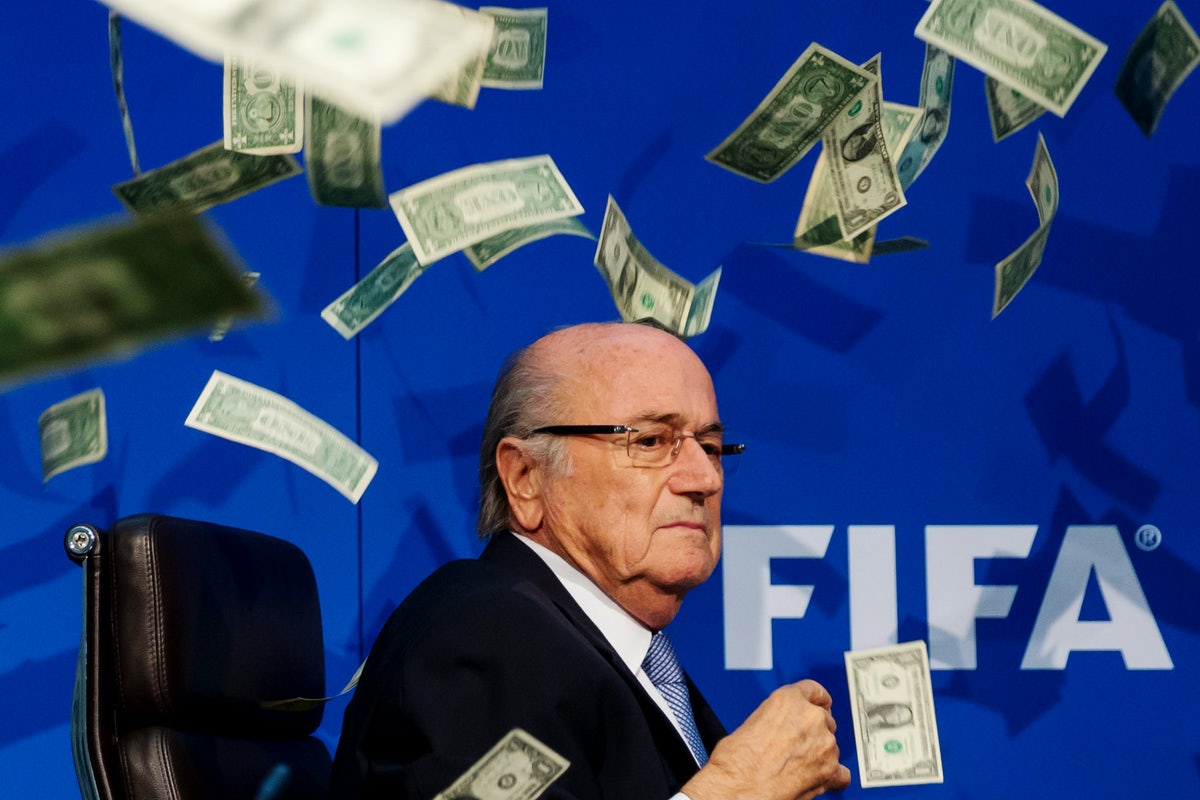
Sepp Blatter: elected in 1998 on the promise of making it rain money.
For instance, who can forget the stellar and breath-taking performances of Cameroons indomitable Lions at Italia ’90 and USA ’94 or Sydney Olympics ’00 or the feat accomplished by the Nigeria Super Eagles at the 1996 Olympics?
Such performances are now fodder for distant memory, with the performance of African teams at global level hitting an all-time low and going through a dramatic slump, which can only be explained at having coincided with the 1998 arrival of Sepp Blatter and his open season of football corruption.
Africa, which is without the mechanisms to protect its football from corruption, and whose football officials are exceedingly happy that Blatter immediately inserted the infamous “no Government interference” clause into the FIFA statutes, which effectively insulated FA officials from prosecution locally, no matter the severity of the theft.
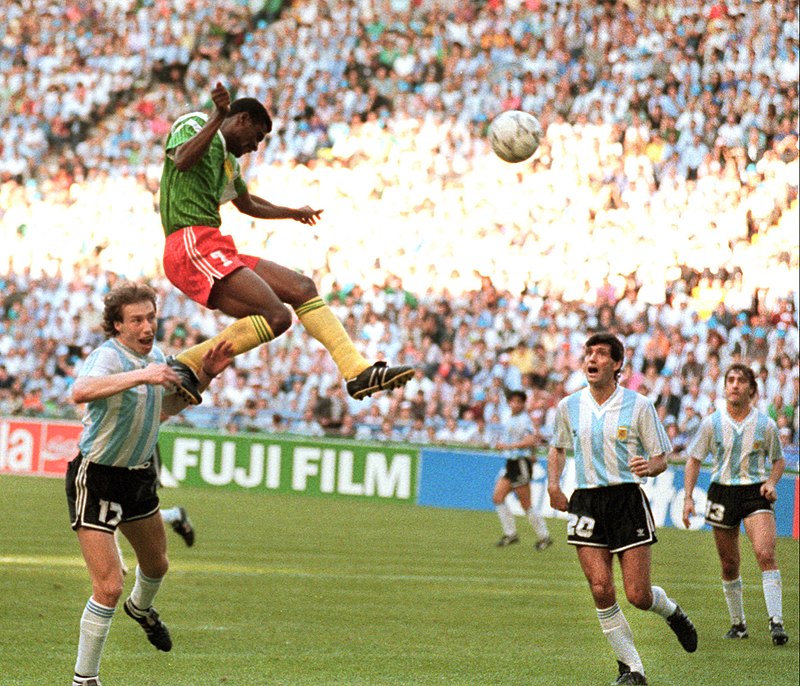
Cameroons Oman Biyik floats to head in the winner against Argentina.
A Government, especially from a Sub-Saharan Africa country that is bold enough to go ahead with such prosecutions, will almost always be slapped with a FIFA ban from all FIFA football competition.
In Kenya, Nyamweya was the pacesetter for and created the handbook that has been used to loot Kenyan football, regardless of which political dispensation has been in office.
Even sadder though, is that virtually all other Kenyan sports Federations reportedly took their cues from football, and in the process borrowed heavily from the Nyamweya – KFF corruption handbook, much to the detriment of local sports over the last quarter century.
After years of exposé after exposé by well-meaning Kenyan media of the corruption in the KFF, Kenyans eventually acknowledged the futility of supporting the local game, turning instead to European football for sustenance, in what has now become the reality, a national football staple for the ages.
Kenyans could see for themselves on the field of play, the child-like unprofessionalism and naïve approach to football, both of their favorite clubs and the National team, when compared with the English or European game.
Kenyan football was certainly not value for money. Television and Radio broadcast either left or stayed away in the mass exodus away from local football, and we can posit here that SUPERSPORT were exceedingly brave to give it a go in Kenya, a decade after all others had fled.
Kenyan football has therefore been in a self-perpetuating cycle of self-destruction, and it will not matter how much money is thrown at it, as long as the endemic corruption is not dealt with urgently.
It was this type of corruption that would eventually take down Sepp Blatter during the now infamous arrests of 15 top FIFA officials and his own indictment and expulsion circa 2015.
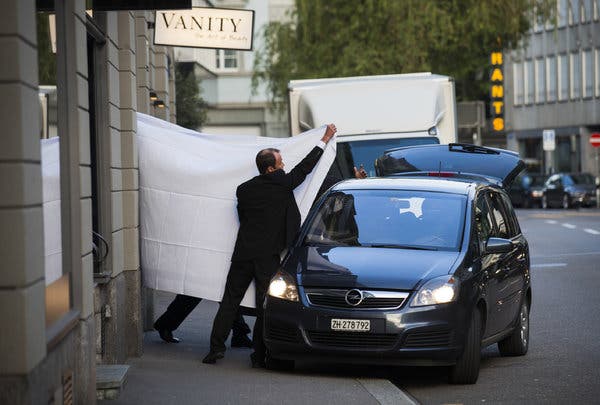
FIFA officials arrested in Zurich for corruption in 2018.
The disgraced Sepp Blatter was replaced in 2016 by his fellow countryman, the now 49-year old Swiss-Italian Gianni Infantino.
The Swiss are a case study of mental dichotomy, on the one hand able to rationalize corruption and their country’s complicity in it while on the other hand, their own development (mainly borne out of this acquiescence of corruption) that has made them a 1st World country.
How do these fuckers sleep at night, you may also be wondering, then wake up the next day to manufacture the rest of the World chocolate?

Infantino and the Swiss legacy of neutrality while working with Nazis.
You would only need to look at the role played by the supposedly “neutral” Switzerland during the 2nd World War, which allowed the country to be a banker of the antagonists in the conflict, but most despicably, its role as the banker of the Nazis whose Swastika-engraved Gold bars, made from smelted teeth that had been pried from the jaws of dead Jews in the death camps like Auschwitz, Treblinka and Sobibor.
The Swiss allowed these to be stored safely in their vaults, and collected afterwards by the accomplices to these criminals, in the post-war years.
Both Sepp Blatter and Gianni Infantino have each at his own time, brought this Swiss mindset to their role as President of FIFA and damningly, their acquiescence of corruption in African and Caribbean football, in return for the votes from these countries at FIFA Congress, for the sole purpose of perpetuating their stays at the helm.
In Kenya, whereas the 1998 broadcast deal with KBC and Kenya Breweries Ltd was exploded by Nyamweya and his thievery, the 2007 Supersport – KPL broadcast deal was imploded by FKF President Nick Mwendwa, exactly two decades later in 2017.
Kenya (once-again) seems to have got the literal short end of the stick with Mwendwa, a greenhorn with zero corporate experience, and minimal club running experience, who somehow managed to get propelled to the top leadership of the National Football body –FKF.
One of the things that motivated Mwendwa and his cohorts from the Nairobi Region (Branch) was to emulate the feeding frenzy that they had witnessed at the Kenyan Premier League (KPL) over the years.
During the decade 2008 – 2018, the Kenyan Premier League was in open season for the most blatant exco-sanctioned theft of sponsorship money by employees and exco members.
The KPL, an organization that is synonymous with the dinosaur Bob Munro, and who handpicked employees based on the highest form of nepotism, would then create a kitchen cabinet, an inner sanctum of decision-making within the KPL that decided how and where money would go, in most cases into their pockets.

Bob Munro, steered the KPL to becoming a den of corruption.
In a few short years, KPL employees were living extraordinarily ostentatious lifestyles, with high-end German-made fuel-guzzlers and seemingly endless cash float at their disposal.
Members of the KPL exco had their sensory perceptions overtaken by the access to such financial windfalls that some were unable to concentrate on the running of their clubs, which were either relegated to the lower tier or completely self-destructed, while other members married 2nd or 3rd wives after destroying their first marriages.
This was the social carnage of the Supersport and other sponsor monies in the KPL.

Mwendwa simply stepped into the footsteps of Bob Munro in how he set up FKF immediately after election, by creating a kitchen cabinet, much like the one also created by CAF President Ahmad Ahmad, and which in both cases influenced critical policy and financial decisions of the organization.
It is these members of the FKF Kitchen cabinet who had the temerity to threaten a female journalist from a leading Kenyan media house with grievous bodily harm and sexual assault, for drilling down on the mismanagement of finances at FKF.
Both FKF and KPL each only ever attempted to disclose their individual financial statements once, hoping probably to bamboozle their reviewers that they had done a stellar job managing finances, and that they were practicing financial probity.

However, a review of the 2013 KPL accounts, for instance, astounded Kenyans from all walks of life who could not comprehend the ridiculously flagrant over-inflation of expenditure.
For instance, the accounts showed that a single-evening awards event cost the KPL a whopping $160,000 to organize, without factoring in the cash awards.
KPL meetings cost the organization a staggering $80,000 which would likely exceed similar expense lines for million-dollar revenue generating blue-chips in that country.
The most notable theft of football money in the KPL is the inclusion of $65,000 expense for a fictitious under-19 competition, which local journalists confirm never happened. Apparently the KPL only ever ogranised one edition of this tournament in 2010, before killing it off, citing high costs. Why then would a fictitious entry be made in the 2013 accounts if not purely for fraudulent reason?
But to really appreciate that the lack of strategic thinking in the KPL was chronic, the books showed that KPL was paying upwards $ 25,000 in annual rent for their offices.
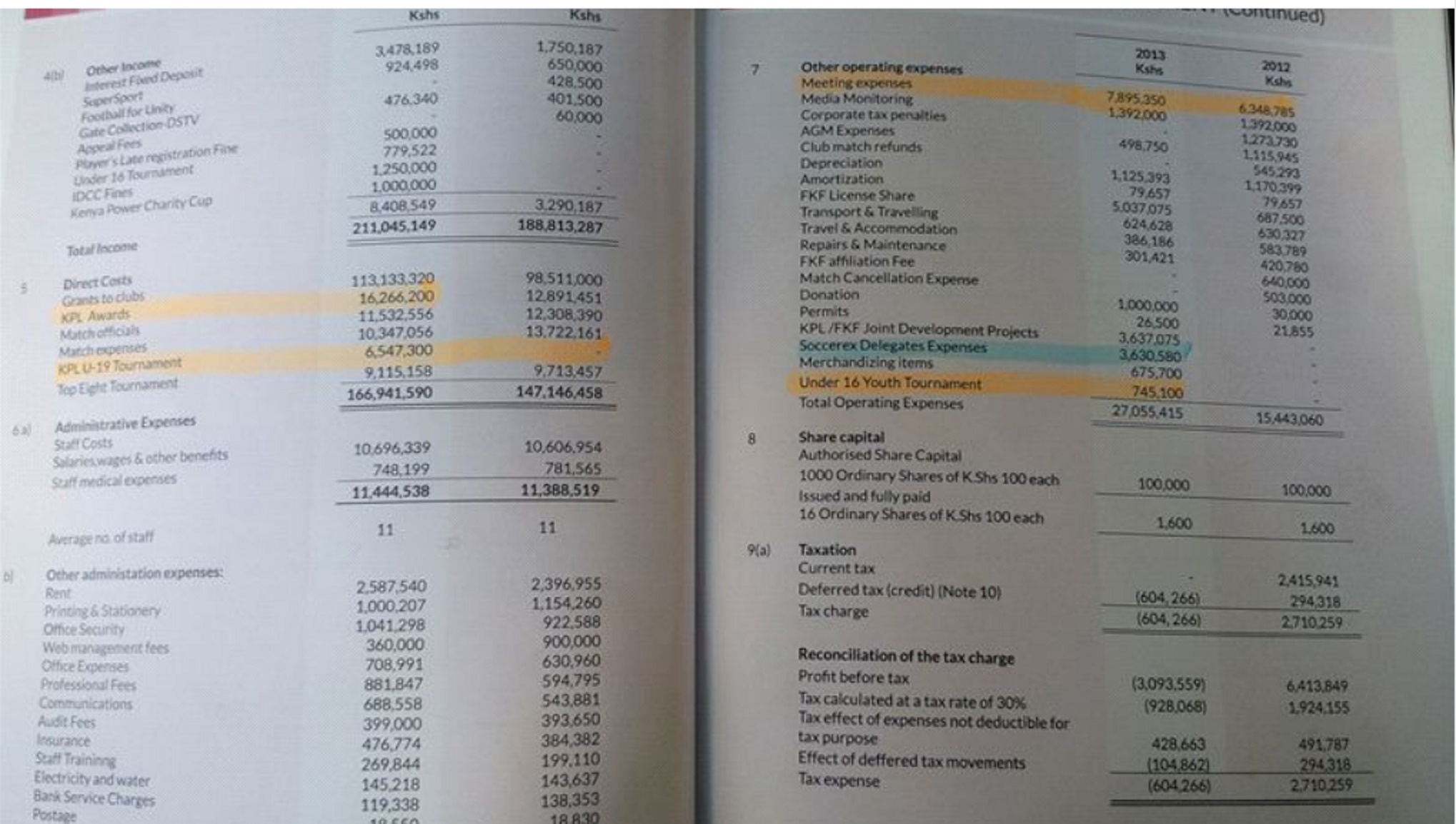
Excerpt from the fraudulent KPL 2013 accounts.
In the 10-year period that KPL had a sponsorship contract, the cumulative $250,000 paid out in rents could easily have acquired the organization a permanent home in the form of an entire floor at high-end part of town, or even a townhouse.
However, it later came out that their rental premises was owned by a member of the inner sanctum of the KPL, and it was therefore profitable for him to influence the status quo to remain to date.
FKF under Mwendwa attempted a similar feat for their 2018 audited accounts, much to the consternation of Kenyans, and similar to that which that met KPL four years earlier.
For instance, the most incredible line items in the FKF accounts was how a one-day AGM for a combined total of 71 delegates cost $70,000 which would roughly work out to $1,000 per delegate.
Obviously one of the expense items that raises eyebrows at FKF is the staff salaries costs of $55,000 per month, which begs the question, how many employees does FKF have and what are their roles?
Conversely, staff medical insurance decreased dramatically from $ 42,000 in 2017 to just slightly less than $5,500 in 2018, which can only point to the existence of “ghost workers” in the muster roll of the FKF, who therefore did not need medical insurance, which would be an automatic benefit of employment in the organization.
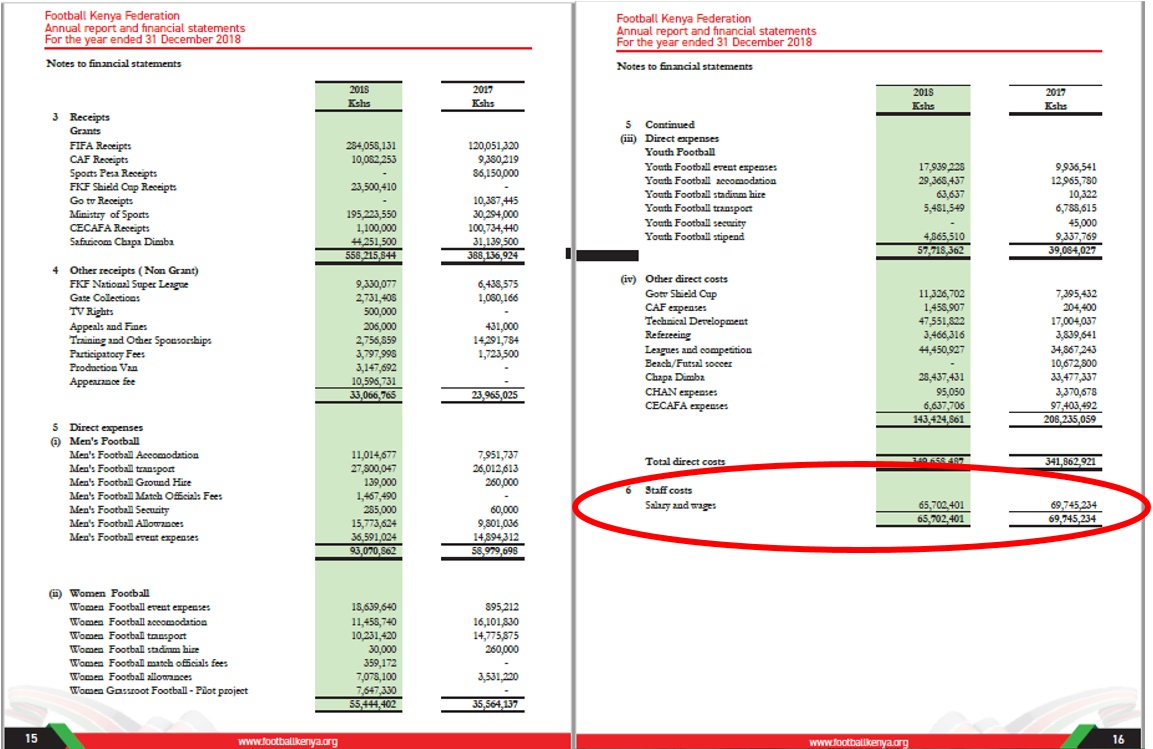
FKF 2018 accounts showing the most blatant looting of Kenya’s football resources.
Another line item that makes absolutely no sense is the massive spike in the “staff meals expenses” which shot up from a 2017 low of $40,000 to a shocking $90,000 expenditure in 2018, and any auditor worth his salt will query the reason.
For instance, did FKF increase the number of employees exponentially in 2018 or did they change employee menu from traditional African to 5-star cuisine, and why?
There is rampant fear within football circles that FKF has staffed its offices with cronies and political appointees who add zero value to the organization. Why is this ridiculously high number of employees needed when FKF cannot even channel FIFA funds to its own Women’s Premier league as agreed?
How does FKF explain expenditure at administrative level totaling $1,417,000 (salaries -$650,000, Admin expenses – $617,500 and operating expenses -$150,000) compared to the direct football expenses which total $ 2,062,000 for 2018 (Men’s football -$930,000, Women’s football – $555,000 and youth football – $577,000).
This comparison of expenses begs a question, what is the core business of FKF?
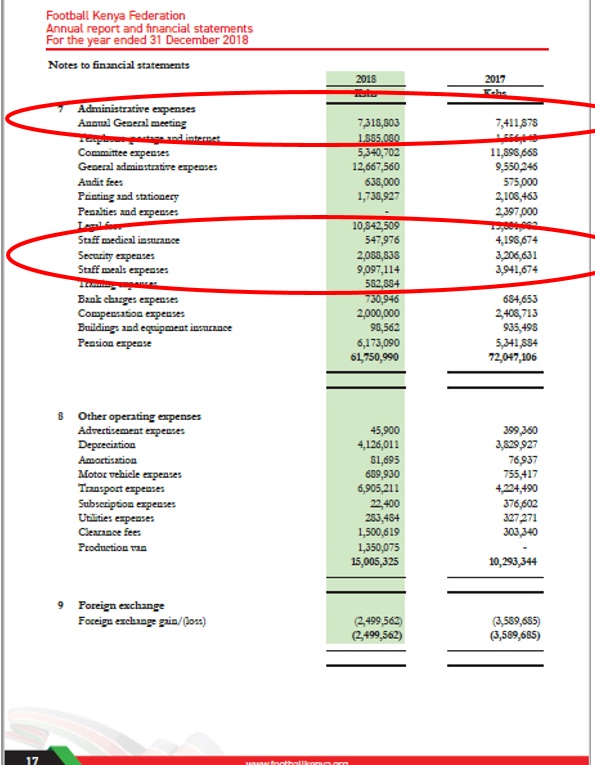
FKF accounts 2018 snapshot of more thievery! FIFA doesn’t give a damn.
How does FKF justify a $1.4 million expenditure on administration to a $2 million direct expense on Men, Women and Youth National team’s expense to FIFA?
Has FIFA raised an audit query to these accounts from 2018 even before it delves into the 2019 version?
Anyone with even a minor understanding of financial reporting will see clearly that FKF have fiddled with the books to hide a massive theft of funds.
Government of Kenya had apparently pressed for an audit of FKF books by the National office of responsibility (auditor) especially to answer questions regarding to the expenditure of the 10s of millions of dollars it has given to FKF.
We postulate that the FIFA head of associations, Veron Mosengo-omba is in a panicked hurry to visit Nairobi and meet Government officials, to impress upon them the need to ignore FKF books of accounts and instead focus on the possibility of a FIFA ban.
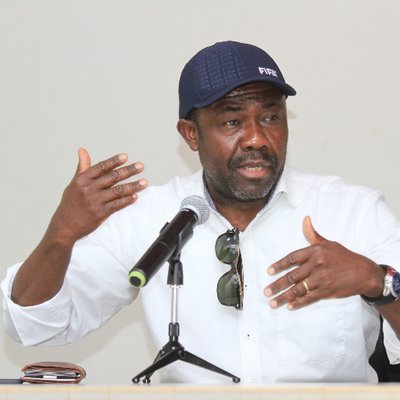
FIFA head of Associations Veron Mosengo-Omba.
In recent history, we all saw FIFA ban Sierra Leone for an extended period of time after the Government prosecuted SLFA President Isha Johansen and SG Chris Kamara in criminal court for financial indiscretions.
The Sierra Leone Government refused to flinch, they held the line that their independent institutions must be respected and allowed to do their work to completion. Eventually the duo of Johansen and Kamara were found not guilty by the courts and FIFA reinstated the SLFA.
In the intervening period, Sierra Leone missed out on the AFCON 2019 qualifiers which they had started on a high, beating the same Kenya 3-1at home.
FIFA will only take Africa seriously when Governments stop playing politics with it and such critical sectors like football, even at the possibility of a FIFA ban.
There has been a lot of talk and questions about why an African team has yet to progress to the knock-out stages of the FIFA World Cup, let alone deign to imagine winning this coveted trophy.
Forget all the voodoo analytics, we can trace the start of African self-sabotage to the late 90s arrival at the helm of FIFA by the Swiss Sepp Blatter, and with him open-season on FIFA and FA finances by those in charge.
This situation has continued even under the much-younger Gianni Infantino, who does not see the need to change things up in Africa and the Caribbean, even when it is evident that the whole World has changed.
Today the Indomitable Lions of Cameroon are a pale shadow of their former selves, a fact made even sadder by the fact that a Cameroonian (Issa Hayatou) sat on the throne of CAF for 29 years.
Cameroon FA (FECAFOOT), only recently came out of a period under FIFA normalization committee, which was preceded by serious problems in the organization.
Egypt FAs elected members all resigned last July, following assertion by the Egyptian Government that it would audit their books on suspicion of corruption.
Today the Egypt FA is being run by a Normalization committee, FIFA knows better than to attempt to play their games with the Government and people of Egypt over something as critical to them as football.
Can Kenya be that turning point for sub-Saharan Africa in this treacherous game played by FIFA?
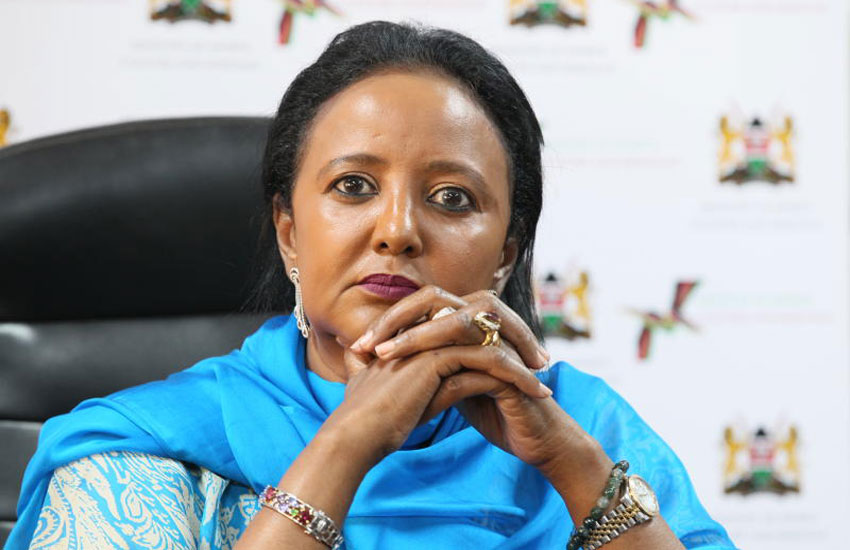
Dr. Amina Mohamed, Kenyan sports Minister: Does she have the moral courage?
If Kenya and its Government took a stand to audit the FKF books of accounts and prosecute those it finds culpable for the loss of FKF funds, then stood its ground against FIFA intimidation and threats, wouldn’t the country be able to rebuild its football from the ground up?
This would not be the first time that the Kenyan Government would be pushing for the prosecution of sports officials, aren’t there currently criminal proceedings against a former Sports Minister and his technocrat alongside several senior members of the country’s Olympic committee following the unearthing of the scandal at the 2016 Rio games?
Do Kenyans and their Government have the balls for this type of resistance against FIFA?
This is a country whose peasants rose up in an armed struggle against the might of the British Empire in the 50s, surely the seed of resistance and courage still exists, as testament to their resilience and determination against this devilishly corrupt edifice of Swiss arrogance and superiority.

